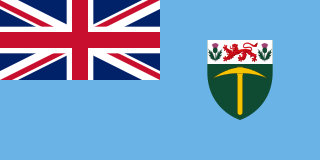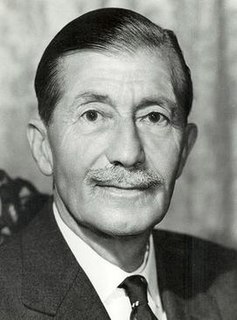
Rhodesia was an unrecognised state in southern Africa from 1965 to 1979, equivalent in territory to modern Zimbabwe. Rhodesia was the de facto successor state to the British colony of Southern Rhodesia, which had been self-governing since achieving responsible government in 1923. A landlocked nation, Rhodesia was bordered by South Africa to the south, Bechuanaland to the southwest, Zambia to the northwest, and Mozambique to the east.

Ian Douglas Smith was a politician, farmer, and fighter pilot who served as Prime Minister of Rhodesia from 1964 to 1979. He was the country's first premier not born abroad, and led the predominantly white government that unilaterally declared independence from the United Kingdom in 1965, following prolonged dispute over the terms. He remained Prime Minister for almost all of the 14 years of international isolation that followed, and oversaw Rhodesia's security forces during most of the Bush War, which pitted the unrecognised administration against communist-backed black nationalist guerrilla groups. Smith, who has been described as personifying white Rhodesia, remains a highly controversial figure—supporters venerate him as a man of integrity and vision who understood the uncomfortable truths of Africa, while critics describe an unrepentant racist whose policies and actions caused the deaths of thousands and contributed to Zimbabwe's later crises.

The Colony of Southern Rhodesia was a self-governing British Crown colony in southern Africa. It was the predecessor state of what is now Zimbabwe.

The Prime Minister of Rhodesia was the head of government in Rhodesia. Rhodesia, which became a self-governing colony of Britain in 1923, unilaterally declared independence on 11 November 1965, and was thereafter an unrecognized state in practice until 1979. In December 1979, the country came under temporary British control, and in April 1980 the country gained recognized independence as Zimbabwe.

Clifford Walter Dupont, GCLM, ID was a Rhodesian politician who served in the internationally unrecognised positions of Officer Administrating the Government and President. Born in London and qualifying as a solicitor, Dupont served during the Second World War as an officer of the British Royal Artillery in North Africa before first visiting Southern Rhodesia in 1947. He returned a year later, started a ranch and emigrated full-time during the early 1950s, by which time the country had become a territory of the Federation of Rhodesia and Nyasaland.

The flag of Rhodesia changed many times as a result of political changes in the country. In 1970, as a result of becoming a republic, Rhodesia adopted a new national flag.

The Rhodesian Security Forces were the military forces of the Rhodesian government. The Rhodesian Security Forces consisted of a ground force, the Rhodesian Air Force, the British South Africa Police and various personnel affiliated to the Rhodesian Ministry of Internal Affairs (INTAF). Despite the impact of economic and diplomatic sanctions, Rhodesia was able to develop and maintain a potent and professional military capability.
The colonial history of Southern Rhodesia is considered to be a time period from the British government's establishment of the government of Southern Rhodesia on 1 October 1923, to Prime Minister Ian Smith's unilateral declaration of independence in 1965. The territory of 'Southern Rhodesia' was originally referred to as 'South Zambezia' but the name 'Rhodesia' came into use in 1895. The designation 'Southern' was adopted in 1901 and dropped from normal usage in 1964 on the break-up of the Federation of Rhodesia and Nyasaland, and Rhodesia became the name of the country until the creation of Zimbabwe Rhodesia in 1979. Legally, from the British perspective, the name Southern Rhodesia continued to be used until 18 April 1980, when the name Republic of Zimbabwe was formally proclaimed.

A double referendum was held in Rhodesia on 20 June 1969, in which voters were asked whether they were in favour of or against a) the adoption of a republican form of government and b) the proposals for a new Constitution, as set out in a White paper and published in a Gazette Extraordinary on 21 May 1969. Both proposals were approved. The country was subsequently declared a republic on 2 March 1970.

Jack William Pithey was a Rhodesian politician who served as the unrecognised state's Acting President between 1 November 1978 and 5 March 1979. He was also the President of the Senate of Rhodesia from 1970 to 1978 having previously been Member of Parliament for the Avondale constituency in north-west Salisbury between 1964 and 1970.

The Southern Rhodesian Legislative Assembly was the legislature of Southern Rhodesia from 1924 to 1970.

Southern Rhodesia first participated as Rhodesia in the Olympic Games in 1928, when it sent two boxers to Amsterdam, both of whom were eliminated in their second bout. The dominion did not appear at the Games under a Rhodesian banner until 1960, when it sent a fourteen-athlete delegation as part of the Federation of Rhodesia and Nyasaland. In Rome, two sailors, Alan David Butler and Christopher Bevan, finished fourth, which was Rhodesia's best result until it became Zimbabwe in 1980. Southern Rhodesia sent 29 competitors, including a field hockey team, to the 1964 Summer Games, which was its last Olympic appearance under the Rhodesian banner.

The constitutional history of Zimbabwe starts with the arrival of white people to what was dubbed Southern Rhodesia in the 1890s. The country was initially run by an administrator appointed by the British South Africa Company. The prime ministerial role was first created in October 1923, when the country achieved responsible government, with Sir Charles Coghlan as its first Premier. The third Premier, George Mitchell, renamed the post Prime Minister in 1933.

The flag of Southern Rhodesia was a blue ensign, later changed to a sky-blue ensign, with the coat of arms of Southern Rhodesia on it. The flag was in use in Southern Rhodesia from 1923 to 1953 and from 1964 to 1965. It was also used by the unrecognised Rhodesia from 1965 to 1968. The flag was initially used unofficially internally before being approved for use outside of the colony by the Colonial Office in 1937. The colour was changed to sky blue in 1964 to protest the treatment of Southern Rhodesia after its inclusion in the failed Federation of Rhodesia and Nyasaland.
Richard Brathwaite Hope Hall ICD was a British-born merchant banker, businessman, and politician active in Rhodesia during the 1960s and 70s. A member of Prime Minister Ian Smith's UDI cabinet, he served as a Member of Parliament in Rhodesia's House of Assembly from 1965 to 1976. He began his political career as a member of the Dominion Party, and served as its chairman from 1960 to 1962. In 1962, he was a founding member of the Rhodesian Front, but switched to the Rhodesian Action Party in 1976. After unsuccessfully running for re-election in 1977, he moved back to the United Kingdom, where he lived until his death.

Lancelot Bales Smith GLM ID, better known as Lance Smith or L. B. Smith, was an English-born Rhodesian farmer and politician. Elected to Parliament in the 1950s, he was a founding member of Rhodesian Front in 1962. He was Minister without portfolio in the cabinet of Prime Minister Ian Smith at the time of Rhodesia's Unilateral Declaration of Independence in 1965. In 1968, after serving as Deputy Minister of Agriculture, he was appointed Minister of Internal Affairs, a position he held until 1974, when he exited politics.

The Southern Rhodesia Act 1965 c. 76 was an Act of the Parliament of the United Kingdom. It was designed to reaffirm British legal rule in Southern Rhodesia after Rhodesia had unilaterally declared independence. In practice it only enforced the status of Southern Rhodesia as a British colony in British constitutional theory as the Rhodesian government did not recognise it.
Maureen Thelma Watson was a Rhodesian politician.

The Parliament of Rhodesia was the bicameral legislature in Rhodesia from 1970 to 1979. Several elections were held, last in 1977.
















